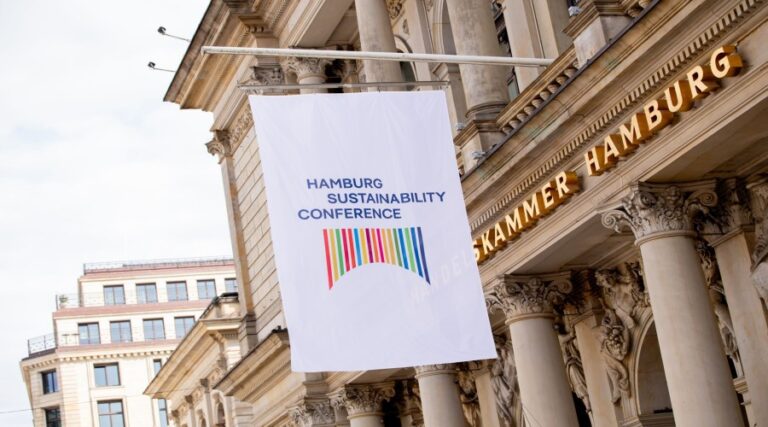Leaders and changemakers from over 110 countries have convened in Hamburg, Germany, for the highly anticipated second edition of the Hamburg Sustainability Conference (HSC)—a major global platform aimed at fast-tracking the implementation of the United Nations 2030 Agenda for Sustainable Development.
This year’s conference, which brings together approximately 1,600 participants across 60 high-level sessions, seeks to foster international cooperation and drive practical solutions to some of the world’s most critical challenges—from climate change and economic inequality to sustainable financing and infrastructure.
Organized by the German Federal Ministry for Economic Cooperation and Development (BMZ) in collaboration with the United Nations Development Programme (UNDP), the Free and Hanseatic City of Hamburg, and the Michael Otto Foundation, the HSC stands as a beacon of global cooperation during a time of mounting uncertainty.
A Platform for Concrete Solutions
At the heart of HSC 2025 are three key thematic pillars:
-
Reforming the Global Financial Architecture
Participants will explore ways to make the international financial system more equitable and sustainable, especially in addressing the debt burdens caused by climate change and other transnational crises. -
Mobilizing Investments for Sustainable Projects
Emphasis will be placed on unlocking private sector capital to accelerate progress toward the UN Sustainable Development Goals (SDGs) and biodiversity targets—particularly in developing and emerging economies. -
Enabling a Just and Inclusive Green Transition
Discussions will focus on strategies for building green urban infrastructure, advancing sustainable mobility, and ensuring socially inclusive ecological transformation.
A Gathering in a Shifting World Order
Despite being just eight months since the inaugural event, the second HSC unfolds against a very different geopolitical backdrop. According to the organizers, 67% of surveyed participants identified “geopolitical tensions” as the leading obstacle to global cooperation.
“In a world increasingly divided, the HSC is a clear call for unity. The challenges we face are too large for any nation to solve alone,” read an official statement from the conference.
The organizers emphasized that HSC is not a one-off event but part of an ongoing global process—one that must continue to deliver impact beyond the conference dates. “Only through sustained, collective action can we achieve real progress.”
Global Voices Call for Deeper Cooperation
Opening the conference, German Development Minister Reem Alabali-Radovan acknowledged the fragility of current international relations and underscored the urgent need for deeper collaboration.
“If the Hamburg Sustainability Conference didn’t already exist, now would be the time to invent it,” she said. “We are in a time when the value of international cooperation is under scrutiny—sometimes aggressively so.”
Hamburg’s First Mayor, Peter Tschentscher, highlighted the city’s strong sustainability strategy and its role in hosting this transformative platform.
“Our city is a hub for business, sustainability, and global engagement. Last year’s conference led to meaningful projects—this year, we aim to build on that momentum,” he remarked.
UNDP Administrator Achim Steiner echoed the importance of unity amid rising uncertainty. “Aid cuts, trade tensions, and a growing debt crisis are squeezing development pathways. Now, more than ever, we need bold cooperation.”
Meanwhile, Michael Otto, Chairman of the Otto Group, emphasized the critical role of the private sector in transitioning from being part of the problem to becoming a key driver of sustainable solutions.
Building on Past Achievements
The inaugural HSC laid a strong foundation with initiatives like the Hamburg Declarations on the Decarbonisation of Global Shipping and Green Aviation, and support for the Global Battery Alliance.
This year, the conference aims to go even further with the launch of two major initiatives:
-
The Hamburg Declaration on Responsible AI for the SDGs
-
The formation of a Global Alliance Against Inequality
These efforts reflect the conference’s commitment to delivering measurable progress in sustainability.
Notable Participation and Cross-Sector Engagement
This year’s conference features a wide array of high-level participants, including:
-
Reem Alabali-Radovan, German Minister for Economic Cooperation and Development
-
Joyelle Clarke, Minister of Sustainable Development, St. Kitts and Nevis
-
Lars Klingbeil, German Vice-Chancellor and Federal Finance Minister
-
Michael Otto, Honorary Chairman, Otto Group
-
Antoine Denoix, CEO, AXA Climate
-
Günther Thallinger, Board Member, Allianz SE
-
Amitabh Behar, Executive Director, Oxfam International
-
Sania Nishtar, CEO, Gavi, the Vaccine Alliance
-
Carolina Pasquali, Executive Director, Greenpeace Brazil
-
Elizabeth Wathuti, Climate Activist and Founder, Green Generation Initiative
Their presence underscores the HSC’s multidimensional approach—uniting leaders across government, business, civil society, and academia—to inspire real action and forge lasting partnerships.
A Call to Action
The Hamburg Sustainability Conference 2025 sends a powerful message: Sustainable development is only possible through inclusive, joint efforts that transcend borders and politics.
As the world grapples with complex global crises, HSC remains a beacon of possibility, cooperation, and hope—reminding us that the path to a better future is paved not just with ideas, but with action.

